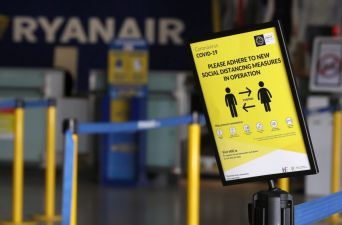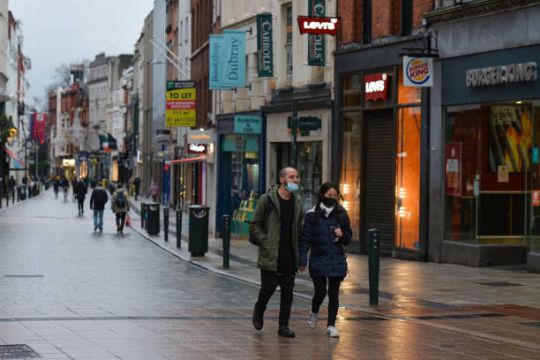There is "no shame" in contracting Covid-19 amid soaring community transmission rates, a Government official has said.
Speaking at a Government briefing on Wednesday morning, Elizabeth Canavan, assistant secretary general at the Department of the Taoiseach, said it is currently "difficult to avoid" contracting the coronavirus in Ireland.
One in every 76 people in Ireland had now received a positive diagnosis for the disease, she added.
"There's no shame in being diagnosed with Covid-19. Testing positive doesn't mean we have done something wrong," the Government official said.
Ms Canavan added that those who test positive or become a close contact must continue to do the right thing, by self-isolating or restricting their movements.
Although case numbers surrounding the virus had begun to decrease, Ms Canavan said that community transmission rates remained "worryingly high".
The current rate of community transmission was many times higher than previously, and double the rate seen at the peak of the second wave of the virus at the end of October, she added.
The extension of Level 5 lockdown restrictions to March 5th was necessary to save lives and protect the health service, Ms Canavan said.
Healthcare workers were under "unbearable strain", with more people in hospital and in intensive care with the virus than at any other time during the pandemic.
"In many ways it will be the next few weeks that are harder than the last, as we need to make the same improvement as then," Ms Canavan said.
The official urged the public to "think twice" before deciding to make a non-essential journey or to visit a beauty spot outside of their five kilometre limit for taking exercise.
"The virus is all around us," she added.
Garda checkpoints would take place in both urban and rural locations to ensure compliance with the measures, though Ms Canavan said the "majority of people" were following guidelines.
It was now also a legal requirement to wear a mask in banks, credit unions and postal offices, she added.
Travel
There should be no non-essential travel, domestic or international, under current Level 5 restrictions.
The majority of those arriving at ports and airports were Irish people returning from abroad, Ms Canavan said. Essential reasons for travel do not include holidays, visiting relatives or friends, or staying at a second home.
On Tuesday, Cabinet Ministers signed off on new restrictions on travel into the Republic, including a mandatory quarantine period in a designated facility for travellers arriving without proof of a negative PCR test for the virus or from the current variant hotspots of Brazil and South Africa.
All other arrivals will be required to quarantine at a location of their choice — with the requirement given a new legal footing.
"Where people are determined to ingnore the regulations on travel, they will face increased penalites," Ms Canavan said.
The official reminded that restrictions on travel do not apply to those escaping from harm or domestic abuse.
Regarding the rollout of vaccines to protect against the disease, Ms Canavan said community vaccination would begin in mid-February, with those over the age of 70.
The approval of vaccines and confirmation of supply were factors outside the control of the Government, but the State's vaccination programme was built to be "flexible and agile" and to respond to new developments, she said.
More would be known regarding the status of the AstraZeneca vaccine later in the week, Ms Canavan added.
Those eligible for a vaccine did not need to take any specific action, with the HSE preparing an information strategy, she said.

Ms Canavan warned that gardaí had been made aware of members of the public receiving fraudulent text mesages and calls regarding vaccination, asking people to confirm private information such as their PPS number or address.
Contact of this nature should be ignored, she said. A person's local GP would be their first point of contact regarding the vaccine, which will be free and not available privately.
It comes as a further 90 deaths and 928 new cases of Covid-19 were confirmed in the Republic on Tuesday, bringing the total death toll in the Republic to more than 3,000.
Dr Tony Holohan, Chief Medical Officer, said more Covid-19 cases had been reported in the month of January than all of 2020.







